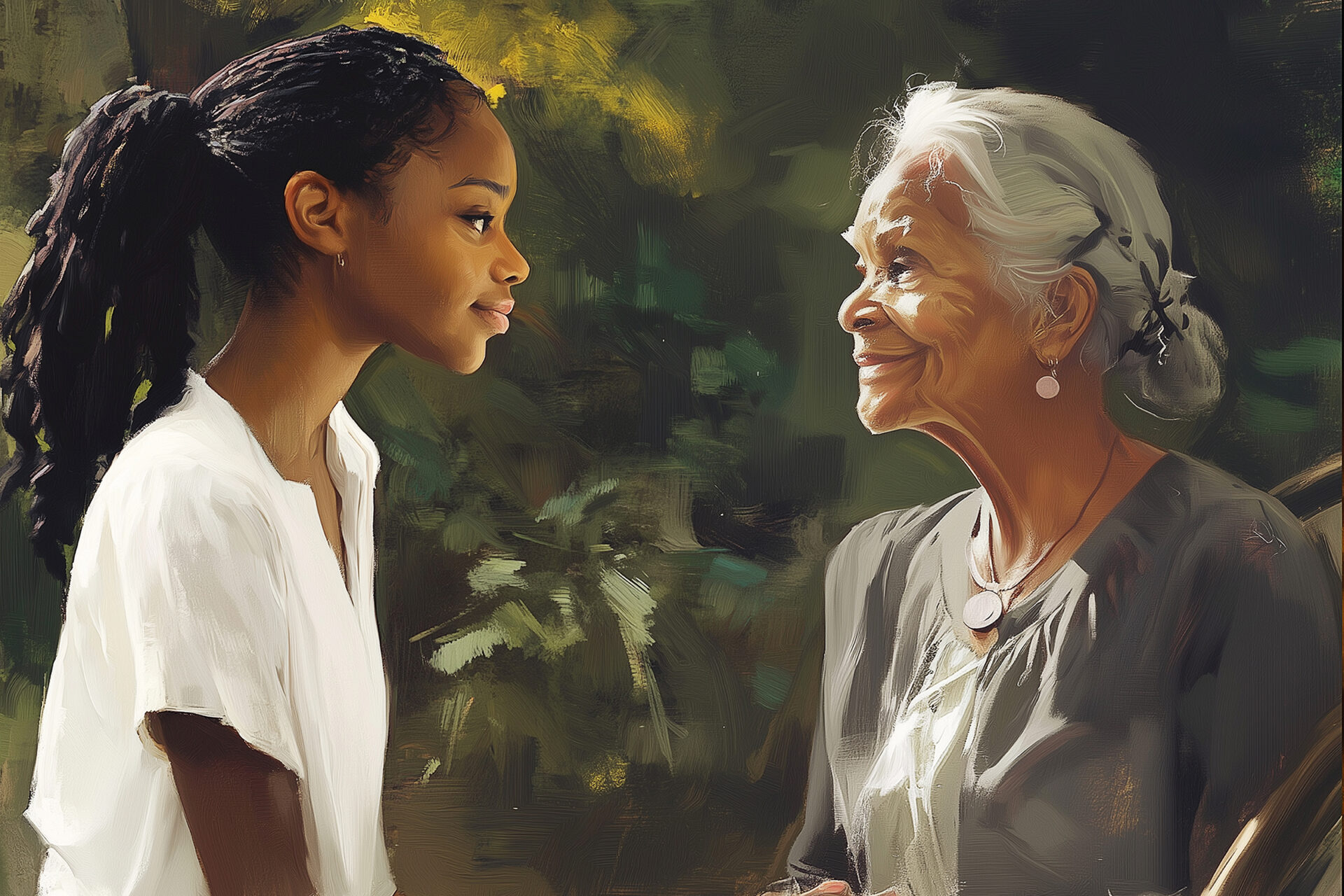In the liberal tradition, the principle of human dignity is the bedrock upon which all other tenets rest. It is the simple, profound notion that every person possesses inherent worth simply by being human. This principle does not depend on wealth, status, nationality, or race; it is universal, unconditional, and fundamental. It is this belief in the innate dignity of all people that forms the foundation for other core principles of classical liberalism: freedom, justice, prosperity, and equality under the law. These values are rooted in the recognition of the equal moral status of every human being as an autonomous free agent.
Human Dignity

Artwork commissioned by the Institute for Humane Studies
The Universality of Human Dignity
To understand the classical liberal commitment to human dignity, one must first appreciate its universality. Not only some are created equal; all are created equal. Unlike other political or philosophical traditions that may assign value based on group membership, personal beliefs, or merit, classical liberalism begins with the assertion that dignity is a birthright of all. It is not earned, and it cannot be taken away. This radical equality is what separates classical liberalism from other schools of thought and serves as the moral justification for its broader principles.
When we say that human dignity is universal, we assert that every individual is deserving of the same fundamental respect and rights as anyone else. It is a leveling principle, rejecting the notion that some groups are naturally superior to others or that any person should be denied their full recognition based on arbitrary distinctions which are irrelevant to our shared humanity. This universality provides the moral compass by which governments, laws, and social norms can be judged. In this sense, the universality of liberalism is profoundly egalitarian.
When we say that human dignity is universal, we assert that every individual is deserving of the same fundamental respect and rights as anyone else.
If human dignity is our foundational principle, then freedom is its corollary. To possess dignity is to possess the capacity for agency, the ability to make choices, and to act according to one’s own reason and judgment. When individuals are denied the freedom to make their own decisions about how to live their lives, their dignity is undermined. Liberalism’s emphasis on individual liberty is therefore not merely a preference for minimal government interference; it is a moral imperative grounded in respect for others and for their freedom to make their own choices.
This is why liberals have historically fought against systems that deny individuals their autonomy. Whether it be totalitarian regimes that seek to control every aspect of life, or coercive social hierarchies that impose rigid and unequal roles on people based on immutable characteristics, liberalism stands as a bulwark for the freedom necessary to fully honor human dignity. When freedom is denied, human dignity is compromised.
The commitment to human dignity also demands a commitment to justice.
The commitment to human dignity also demands a commitment to justice. Liberalism is not indifferent to injustice; rather, it demands legal and social systems which protect individuals against the violation of their equal rights. Justice, in this sense, is the defense of human dignity. It requires that all individuals be treated fairly and that their rights be safeguarded. It demands accountability for those who would trample on the rights of others.
A just society is, in large part, one that ensures that all people are treated equally before the law. It rejects the idea that some individuals or groups should receive special privileges or, conversely, be subjected to special burdens based on characteristics such as race, gender, religion, or social class. It also recognizes that people deserve protection against violence and exploitation, regardless of their status or identity.
A Commitment to Others

The principle of human dignity extends beyond self-interest; it requires a commitment to the dignity of others. Liberals are not only interested in defending their own freedoms or ensuring justice for their own communities. The recognition of universal human dignity means that we are obligated to care about the rights and freedoms of all individuals, regardless of whether their struggles directly impact us. This moral commitment requires that we stand in solidarity with those who are oppressed or marginalized, wherever they may be.
This universality challenges the narrowly self-interested notions of political interests, and rebuts the charge that radical liberalism is ‘atomistic’ or selfish in its individualism. The idea that liberalism is merely about individual self-reliance misses the deeper moral imperative: it cares about the freedom and dignity of others because it recognizes that these are universal goods, not privileges reserved for a few. The dignity of one is bound up with the dignity of all.
The principle of human dignity extends beyond self-interest; it requires a commitment to the dignity of others.
The classical liberal commitment to human dignity has broad implications for how we structure society and the policies we pursue. It calls for a legal system that protects individual rights and ensures justice for all. It demands that we tear down barriers that prevent full participation in civil society, backed by the coercion of the state. It requires vigilance against forces—whether in the form of authoritarian governments, assaults on civil liberties, or bigoted prejudices—that seek to undermine the inherent value of any person.
Furthermore, it means that classical liberals must advocate for a society that values and protects freedom of expression, freedom of association, and the freedom to pursue one’s own happiness. These freedoms are not just abstract rights; they are the conditions that allow human dignity to flourish. When we protect these freedoms, we affirm the inherent worth of every individual, giving them the space to express themselves, participate in civic life, and develop their potential.
Classical liberalism’s commitment to human dignity is a call to action. It challenges us to build a society where freedom and justice are not privileges for the few but instead are rights for all.
Human dignity is not simply one principle among many; it is the foundation upon which the entire system of thought rests. It demands that we see each person as valuable in and of themselves, and deserving of freedom, justice, and fair treatment. It obligates us to oppose any system or ideology that seeks to devalue or diminish the worth of individuals based on arbitrary distinctions like race, gender, or status.
Classical liberalism’s commitment to human dignity is a call to action. It challenges us to build a society where freedom and justice are not privileges for the few but instead are rights for all. It reminds us that our defense of liberty is not complete unless it extends to every person. In the end, the principle of human dignity is what grounds our belief in a free and just society—one where all people can stand as equals, possessing the same intrinsic worth and deserving of the same fundamental rights.
By supporting IHS, you invest in scholars at a formative stage in their careers. Not only with crucial financial support, but with inspiration and connections to other like-minded and driven intellectual collaborators that they can’t find from any other funder.
